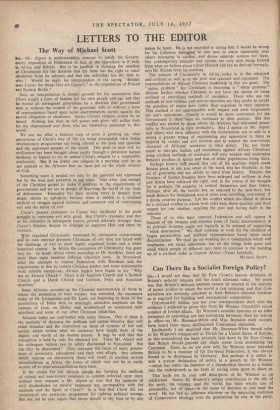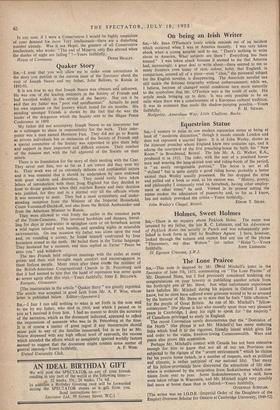Can There Be a Socialist Foreign Policy?
Sm,—I would not deny that Sir Eyre Crowe's famous definition of Britain's national interests still has much relevance today. My point was that Britain's national, interests cannot be secured in the anarchy of power politics to which the world is fast returning, and that Con- servatives are naturally reluctant to limit Britain's national freedom as is required for building nevi' international communities.
Unfortunately neither you nor your correspondents dealt with the evidence I adduced to prove this from Sir Winston Churchill's recent conduct of foreign affairs. Sir Winston's oracular speeches as an elder statesman in opposition are less convincing testimony than his actions in office—as Mr. Rrooman-White and Miss Branston must recently have heard from many disillusioned Continental statesmen. .
Incidentally I am surprised that Mr. Brooman-White should refer to Sir Winston's trumpet-call at Zilrich for a United States of Europe, as this contradicted the basic principle laid down by Sir Eyre Crowe, that Britain should prevent any single power from dominating the Continent. Since, as we are now told, Sir Winston never intended Britain to be a member of his European Federation, it was always bound to be dominated by Germany. But perhaps it is unfair to seek a precise declaration of policy in a speech by Sir Winston —which has rather the function of a thunderflash thrown by a hunter into the undergrowth in the hope of raising some game to shoot at.
This leads me to your odd description of Sir Winston as an intellectual. Surely Sir Winston's unique contribution to the life of his party, his country, and the world, has been wholly one of personality, not of ideas—in the sense of doctrine as you used the word. He has had no influence whatever on the interesting evolution of Conservative ideology over the generations he was in the party. In any case, if I were a Conservative I would be highly suspicious of your demand for more Tory intellectuals—there are a disturbing number already. Was it not Hegel, the greatest of all Conservative intellectuals, who wrote: "The owl of Minerva only flies abroad when the shades of night are falling " ?—Yours faithfully,



































 Previous page
Previous page